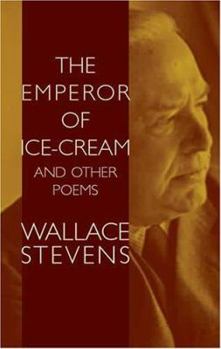The Emperor of Ice-Cream and Other Poems
Select Format
Select Condition 
Book Overview
An insurance company executive with a law degree, Wallace Stevens (1879-1951) lived an outwardly conventional life but composed highly original and exotic works of verse. One of America's most important twentieth-century poets, Stevens forever changed the landscape of modern poetry with his provocative, experimental style.
This first-rate collection by the winner of the 1955 Pulitzer Prize for poetry invites students and other readers to enjoy the richness and variety found in 82 of Stevens's finest creations. Included are such well-known compositions as "Sunday Morning," "Disillusionment of Ten O'Clock," "Anecdote of the Jar," "Peter Quince at the Clavier," "Thirteen Ways of Looking at a Blackbird," and the title piece -- the author's favorite -- as well as lesser known yet equally stimulating works such as "The Florist Wears Knee-Breeches" and "The Man Whose Pharynx Was Bad."
Invaluable to students of American literature, this volume will be an indispensable treasury for lovers of modern poetry.
This first-rate collection by the winner of the 1955 Pulitzer Prize for poetry invites students and other readers to enjoy the richness and variety found in 82 of Stevens's finest creations. Included are such well-known compositions as "Sunday Morning," "Disillusionment of Ten O'Clock," "Anecdote of the Jar," "Peter Quince at the Clavier," "Thirteen Ways of Looking at a Blackbird," and the title piece -- the author's favorite -- as well as lesser known yet equally stimulating works such as "The Florist Wears Knee-Breeches" and "The Man Whose Pharynx Was Bad."
Invaluable to students of American literature, this volume will be an indispensable treasury for lovers of modern poetry.
Format:Paperback
Language:English
ISBN:048644077X
ISBN13:9780486440774
Release Date:March 2005
Publisher:Dover Publications
Length:84 Pages
Weight:0.35 lbs.
Dimensions:0.3" x 5.5" x 8.7"
Customer Reviews
2 ratings
An introduction to an indispensable poet
Published by Thriftbooks.com User , 19 years ago
After Whitman and Dickinson, Stevens is the American poet. The great beauty of his lines is musical and lyrical, colorful and rich with light.His lines have memorable( and re-memberable quality) that few poets can match. He has a Keatsian long- line aesthetic feeling, a sense of sensual reality, an experiential touch .This combined with a reflectiveness which makes and aches at a harmony of its own. Who can match lines like, (" Susanna's music touched the bawdy strings of those white elders, but escaping, left only Death's ironic scraping" or " Deer walk our mountains / and in the isolation of the sky at evening/ Casual flocks of pigeons make ambiguous undulations/ as they go downward to darkness on extended wings.") " A poet makes a music of his own and in his inner dissonance reflects a star a sea a world forever home in words whose Beauty Lines of Light attest."
Good introduction
Published by Thriftbooks.com User , 20 years ago
Wallace Stevens was one of the best poets of the twentieth century, with his richly atmospheric writing and multilayered themes about religion, nature and the imagination. "The Emperor of Ice Cream" is a good introduction to his work, collecting various poems into one volume. "Let the lamp affix its beam/The only emperor is the emperor of ice-cream," Wallace writes in the title poem. Other poems included are the eerie "Tattoo" ("The webs of your eyes/Are fastened/To the flesh and bones of you/As to rafters or grass"), the thirteen-part poem "Thirteen Ways of Looking at a Blackbird," the haunting "Domination of Black" ("I saw how the night came,/Came striding like the color of the heavy hemlocks"), and the languid, semi-spiritual "Sunday Morning." The Dover Thrift collection does a good job of showing the various kinds of poetry that Stevens wrote -- some are infused with color, some with darkness, some with a rich overtone, some very brief like the tiny "Valley Candle." Many of Stevens' best poems are included in here. One thing that Stevens' writing always has is beauty -- even in the weird ones. With only a few words he can evoke images that are exquisite, soothing, even eerie ("My candle burned alone in an immense valley"). He also infuses his poetry with intense colors and plenty of nature references, birds and trees, snow and rain and wind. "The Emperor of Ice Cream" -- despite the somewhat silly title -- is an excellent showcase for some of Stevens' best works. Definitely worth checking out for fans of richly-conceived verse.





